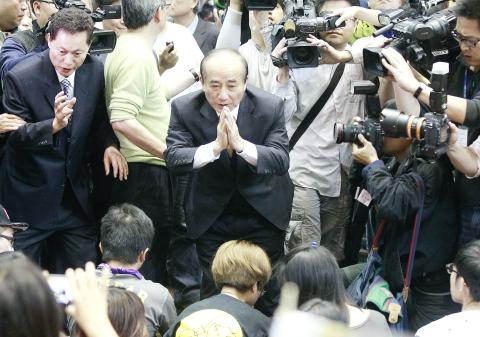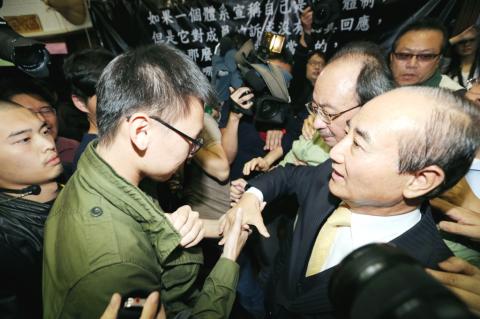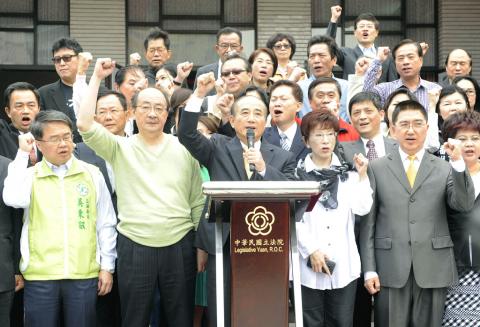Legislative Speaker Wang Jin-pyng (王金平) promised yesterday to enact a law monitoring Taiwan’s pacts with China before the legislature reviews the controversial cross-strait service trade agreement.
The move was welcomed by the student activists, but they have yet to decide whether to withdraw from the legislative compound.
Wang made the announcement during a high-profile visit to the student protesters on the occupied legislative chamber, but prior to entering the room, he held a press conference saying that he has never shunned the responsibility for mediating the conflicts between the Chinese Nationalist Party (KMT) and Democratic Progressive Party (DPP) over the pact’s handling.

Photo: Pichi Chuang, Reuters
He expressed regret and concern that the attempts to solve the dispute by having the KMT secretary-general and DPP convener communicate face-to-face and by holding six cross-party negotiations have all failed to reach consensus.
“The legislature is the sanctuary of democracy, not because of its grandiose architecture, but because it can reflect the people’s voice. The appropriateness of the means the students have employed to reach their ends is open to discussion, but what they are doing is making people reflect upon democracy,” he said.
“I’m hesitant to criticize the students’ aspirations to widen civic participation, but I also hope to caution them that long-term occupation of the legislature has halted the review of bills that could have an impact on people’s livelihood,” he said.

Photo: Lo Pei-der, Taipei Times
“I call on the students to go back to where you belong and enrich yourself and continue to display conviction, tenderness, rationality and peace to make the world respect our democracy,” Wang added.
Wang said he “would not convene [another] inter-party negotiation about the cross-strait service trade agreement until the draft of cross-strait agreements oversight mechanism has been legislated.”
He said “the country’s development and stability turns on the ruling party’s tolerance and forbearance, the opposition party’s wisdom and the people’s support” and that “we will learn lessons and better observe public opinion in future national policy promotion and implementation.”

Photo: Chen Chih-chu, Taipei Times
Wang concluded his talk by saying that he hopes the dispute can end peacefully and calling out “Taiwan, jia you [加油, an expression of encouragement]!” several times.
Wang then walked into the chamber and shook hands with several students while student leader Lin Fei-fan (林飛帆) said Wang’s comment showed that the protest has achieved preliminary results.
Wang left the legislature without making a public speech.
DPP caucus whip Ker Chien-ming (柯建銘), who accompanied Wang during his press conference and visit, said that Wang would not initiate the review of the service trade pact until the legislation of a cross-strait agreement oversight mechanism has been accomplished.
The students welcomed the comments, but said any withdrawal from the compound would require further discussion with Sunflower movement participants.
“We welcome the response that Wang has made to our demands during a brief stay at the Legislative Yuan at 11am this morning,” student leader Chen Wei-ting (陳為廷) told a crowd yesterday afternoon rallying outside the legislature. “The most important part of his remarks is that he promised that he would not call a cross-party negotiation on [reviewing] the cross-strait service trade agreement before passing a legislation to monitor cross-strait agreements.”
Chen said that as the KMT could not reach an agreement with opposition parities on reviewing the cross-strait trade pact, “when Wang said that he would not call a cross-party negotiation before adopting the monitoring bill means that, in fact, he is positively responding to our demand to pass the legislation before reviewing the trade pact.”
Chen then urged all lawmakers regardless of their party affiliation to work with Wang to independently advance the monitoring mechanism.
“This breakthrough is all because of the efforts that Taiwan’s civil society has made in the past three weeks. We would like to pay our highest respect to all those who have either actively participated, or expressed your support in different ways,” Chen said, bowing to the crowd with several student leaders, including Lin.
“We have gone through many things that made us feel powerless, we have been saddened by tears and bloodshed,” Lin said. “But today, we can proudly say that we are finally seeing the break of dawn in this nation.”

INVESTIGATION: The case is the latest instance of a DPP figure being implicated in an espionage network accused of allegedly leaking information to Chinese intelligence Democratic Progressive Party (DPP) member Ho Jen-chieh (何仁傑) was detained and held incommunicado yesterday on suspicion of spying for China during his tenure as assistant to then-minister of foreign affairs Joseph Wu (吳釗燮). The Taipei District Prosecutors’ Office said Ho was implicated during its investigation into alleged spying activities by former Presidential Office consultant Wu Shang-yu (吳尚雨). Prosecutors said there is reason to believe Ho breached the National Security Act (國家安全法) by leaking classified Ministry of Foreign Affairs information to Chinese intelligence. Following interrogation, prosecutors petitioned the Taipei District Court to detain Ho, citing concerns over potential collusion or tampering of evidence. The

Seventy percent of middle and elementary schools now conduct English classes entirely in English, the Ministry of Education said, as it encourages schools nationwide to adopt this practice Minister of Education (MOE) Cheng Ying-yao (鄭英耀) is scheduled to present a report on the government’s bilingual education policy to the Legislative Yuan’s Education and Culture Committee today. The report would outline strategies aimed at expanding access to education, reducing regional disparities and improving talent cultivation. Implementation of bilingual education policies has varied across local governments, occasionally drawing public criticism. For example, some schools have required teachers of non-English subjects to pass English proficiency

‘FORM OF PROTEST’: The German Institute Taipei said it was ‘shocked’ to see Nazi symbolism used in connection with political aims as it condemned the incident Sung Chien-liang (宋建樑), who led efforts to recall Democratic Progressive Party (DPP) Legislator Lee Kun-cheng (李坤城), was released on bail of NT$80,000 yesterday amid an outcry over a Nazi armband he wore to questioning the night before. Sung arrived at the New Taipei City District Prosecutors’ Office for questioning in a recall petition forgery case on Tuesday night wearing a red armband bearing a swastika, carrying a copy of Adolf Hitler’s Mein Kampf and giving a Nazi salute. Sung left the building at 1:15am without the armband and apparently covering the book with a coat. This is a serious international scandal and Chinese

NEGOTIATIONS: The US response to the countermeasures and plans Taiwan presented has been positive, including boosting procurement and investment, the president said Taiwan is included in the first group for trade negotiations with the US, President William Lai (賴清德) said yesterday, as he seeks to shield Taiwanese exporters from a 32 percent tariff. In Washington, US Trade Representative Jamieson Greer said in an interview on Fox News on Thursday that he would speak to his Taiwanese and Israeli counterparts yesterday about tariffs after holding a long discussion with the Vietnamese earlier. US President Donald Trump on Wednesday postponed punishing levies on multiple trade partners, including Taiwan, for three months after trillions of US dollars were wiped off global markets. He has maintained a 10 percent